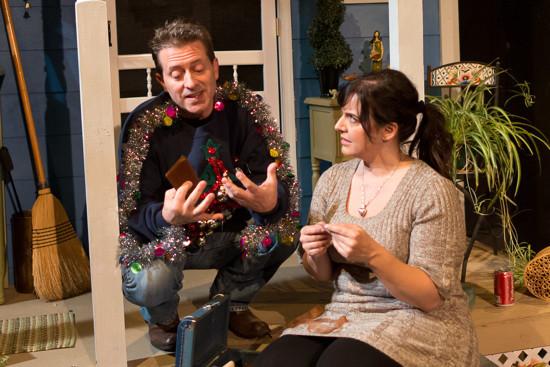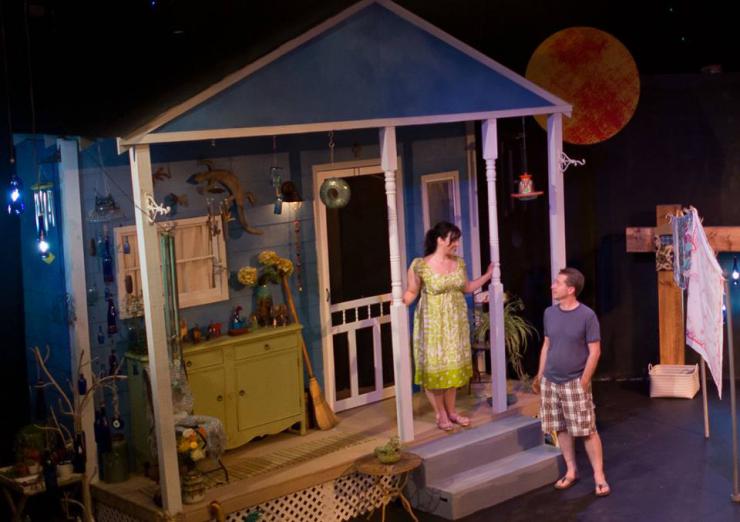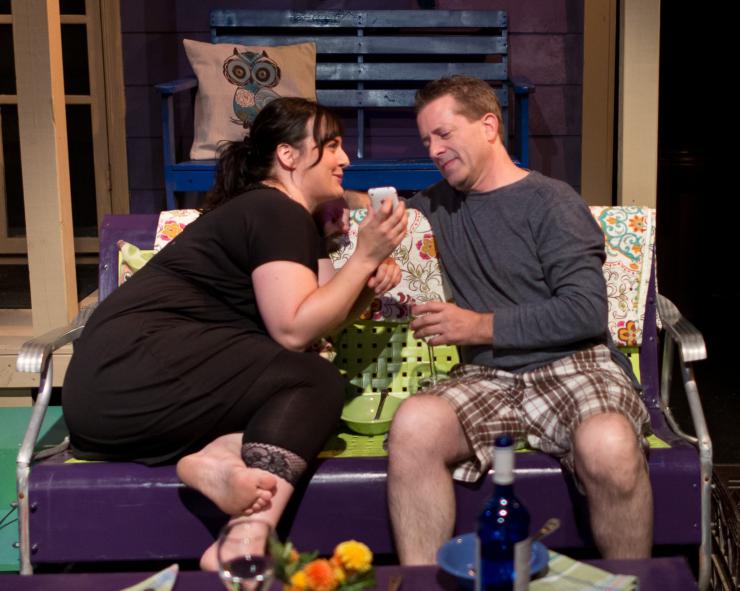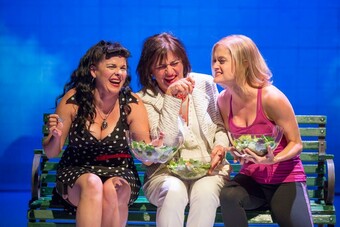Maytag Virgin, Quotidian Theatre's Sweet Success
Audrey Cefaly’s Maytag Virgin, at Quotidian Theatre, is a delightful world premiere, produced as part of the DC’s Women’s Theatre Festival. Funny and poignant, the play takes us to the heart of the South, in an imagined town in Alabama, to explore the questions of the heart.

The plot is simple: new neighbors Lizzie and Jack, both grieving their spouses’ deaths, slowly overcome their fears and fall in love. While the story is straightforward, Lizzie and Jack, played masterfully by Gillian Shelly and William Hardy, are complex and layered. Cefaly, who lives in the DC area but grew up in Mississippi, peppers her fantastically witty dialogue with colorful regionalisms, delivered by Shelly and Hardy in perfect Southern accents. We are immediately drawn in by Lizzie, an English teacher, who upon first meeting her new neighbor implores him not to address her as Ma’am. “It’s not dried up or dead or anything. Still got some life in it,” she declares, referring to her feminine vital parts. Jack, a physics teacher, marvels, “You say it all out loud.” But it takes over a year for this spunky, confident Southern woman to reveal how her husband died and what role she believes she played in his death.
Lizzie and Jack each nurse wounds and longings. A compelling tension in the play is the friction between those hurts and needs and the neighborly chitchat and charm that obscures them, sometimes well, and sometimes less so. Each is trying to go on with life and, to one degree or another, failing. Jack sleeps on the porch, believing his new house is haunted. Lizzie has closed herself off to the idea of romance, from any quarter.
A director unfamiliar with the culture might have struggled with the nuances of character and dialogue, but Cefaly is able to amplify and enhance her intent.
Cefaly directs the production herself, and her decisions are largely on target. A director unfamiliar with the culture might have struggled with the nuances of character and dialogue, but Cefaly is able to amplify and enhance her intent. The casting is perfect. Gillian Shelly is completely believable as a sturdy, down-to-earth Southern English teacher, whose life and dresses have grown too small. William Hardy has a languid, homespun elegance. He is able to portray that he is smitten through a mere look. Cefaly uses well-chosen music (sound design by Ed Moser ) between scenes—indie folk songs that underline the emotional content and contribute to a solid sense of place. The music at times intrudes during the scenes, as if the play were a film. While this calls attention, it doesn’t necessarily detract from our engagement in the play.

The set created by Scott Hengen, and decorated by Heather Brooks, functions almost as another character. The porches of two clapboard houses flank each end of the stage. The space in between them, which constitutes the yards, is in Lizzie’s case outfitted with a clothesline. Jack has a dryer on his porch, an arrangement that become a source of contention. The changing décor of the porches reflects the passage of time but also the strides Lizzie and Jack are making in their lives. After a year has passed since they first met, Jack sets up his porch beautifully with a couch, a coffee table, two bowls, and two wineglasses. Lizzie compliments him on the appealing arrangement he has created, believing he has a date. She is surprised to learn that she is the one he’s inviting for supper. He wears an apron with a frog on it: “Will grill for kisses.” They drink wine, and then moonshine. And they do kiss. But the evening ends in a drunken squall. Lizzie storms off after telling Jack that she hates him.
The rest of the play is given over to her slow coming around. The process holds our attention, but on a couple of occasions the audience, believing the play was ending, broke into applause. We are used, perhaps, to ambiguous endings. They have a kind of elegance, and they are safe: no one will accuse the playwright of overkill or wrapping things up too neatly. But Cefaly takes the romance to a crescendo, ending the play with swelling music and a kiss. It works, strangely enough. The audience is invested enough to rejoice rather than roll their eyes. And a daringly earnest charmer of a play is a nice break from the glib and ironic work that is more common and in some senses less risky.
We are used, perhaps, to ambiguous endings. They have a kind of elegance, and they are safe: no one will accuse the playwright of overkill or wrapping things up too neatly.
Quotidien Theatre has no qualms about earnestness. Quotidian, which produces at Bethesda’s Writers Center, aims to “find truth and beauty in the everyday… illuminating the depth and dignity of ordinary human experience.” Cefaly’s play does just that.

Maytag Virgin is not the kind of play you think about afterwards for days. It’s a play that asks us to feel deeply, rather than chew over unresolved questions. Still, it leaves its mark. I left the theatre feeling uplifted and transformed, grateful to Cefaly for writing the play and to Quotidian for putting this kind of work, daring in its own way, on stage.






Comments
The article is just the start of the conversation—we want to know what you think about this subject, too! HowlRound is a space for knowledge-sharing, and we welcome spirited, thoughtful, and on-topic dialogue. Find our full comments policy here